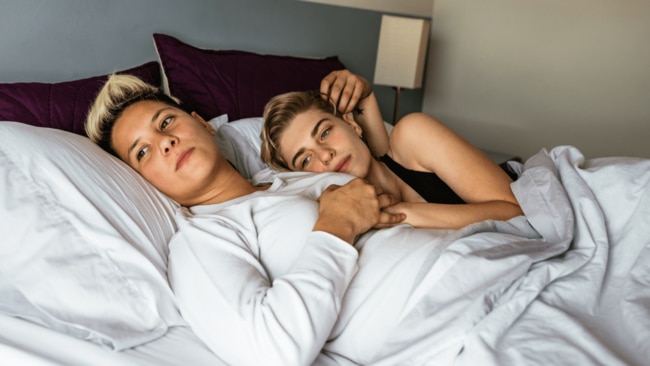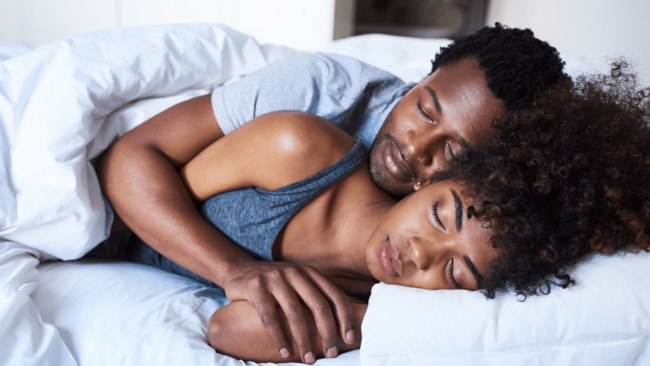This is the one thing killing your sex life, research finds
The good news? It could be an easy fix

Lifestyle
Don't miss out on the headlines from Lifestyle. Followed categories will be added to My News.
If you struggle to work up the energy for a romp in the bedroom, have you taken a look at your sleeping habits? Experts say it might be time you did.
It’s a common belief that your sex life dwindles as you and your partner age, and that many couples grow apart when it comes to their sexual preference.
But new research shows there’s one other factor which has a much bigger impact on your sex life, and it disproportionately affects women.
Like what you see? Sign up to our bodyandsoul.com.au newsletter for more stories like this.
The new study, published in the Journal of Psychosomatic Research in January, found that “healthy sleep is a key component of sexual function”, and vice versa, a lack of sleep can take a huge toll.
The cross-sectional survey, called the Sleep and Sex Survey, aimed to explore the relationships between insomnia severity and “sexual satisfaction, and sexual function” – which they found had a clear correlation.
“A very recent systematic review and meta-analysis of 32 cross-sectional studies and 11 longitudinal studies determined that the risk of a sexual dysfunction among those with a sleep disorder was approximately double that of those with no sleep disorders,” says the study.

The study uses measures of sexual satisfaction and sexual dysfunction to measure the impacts of insomnia, and both satisfaction and functionality were found to be impacted.
It also considered measures that contribute to insomnia, like “fear of sleep, nightmares, sexual function, sexual satisfaction, sexual activity, depression, anxiety, posttraumatic stress, and alcohol use”.
“Recent sexual activity was correlated with better sleep, lower anxiety, and lower scores on a posttraumatic stress disorder screener,” says the report. Likewise, “Insomnia severity was negatively correlated with sexual satisfaction…and the presence of insomnia was associated with higher rates of sexual dysfunction in women and men.”
While sleep is often overlooked as a contributing factor of a great sex life, the study found that it’s essential, particularly when it comes to women’s performance and enjoyment.
“Women had approximately twice the rate of both sexual dysfunction and insomnia as that experienced by men,” said Dr Wilfred Pigeon from the University of Rochester, New York, who was the lead researcher on the study.
However, “the presence of clinical insomnia was strongly associated with poorer sexual function in both men and women,” he told the New York Post.

More than half of women battling insomnia had trouble reaching orgasm and experienced a lower level of satisfaction in bed overall. There was less than a third of women surveyed who were unsatisfied who didn’t also suffer from poor sleep.
When it comes to men, insomnia also plays a role in sexual problems, but not to the same degree.
Men who experience insomnia accounted for 23 per cent of those reporting “issues with climaxing and overall dissatisfaction”. Meanwhile, only 12.5 per cent of men with those issues said they got enough rest.

So why does sleep have such an impact on our enjoyment and experience of sex?
For one, a lack of sleep often has a high correlation with mental health conditions such as anxiety and depression – and can also contribute to them.
According to a 2017 study published in the October issue of the Sleep Science journal, “It is likely that, even with increased sexual arousal, the tiredness that results from lack of sleep often interferes with intimacy, which might ultimately lead to sexual difficulties.
“Sleep problems have been related to erectile dysfunction and female sexual difficulties” – a vague term which may include difficulty reaching orgasm, loss of libido, painful sex, vaginal bleeding or vaginismus.
Interestingly, “after accounting for depression and anxiety, insomnia had a statistically significant association with sexual function for women but not men
Other literature suggests that a lack of sleep can lead to a reduced libido as “Poor or insufficient sleep is linked to reduced testosterone – and reduced testosterone is linked to reduced sex-drive. Research suggested that this effect occurs in both men and women.”
Interestingly, the January study showed that “after accounting for depression and anxiety, insomnia had a statistically significant association with sexual function for women but not men.
Originally published as This is the one thing killing your sex life, research finds





